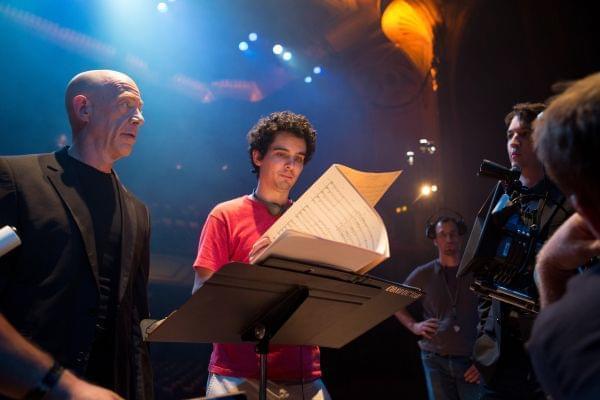Roll Out The Red Carpet: Illinois Is Going To The Oscars

Director Damien Chazelle discusses a concert scene with actors J.K. Simmons (Fletcher) and Miles Teller (Andrew). Daniel McFadden/Sony Pictures Classics
The film Whiplash was made without the promise of wide-scale distribution. On Sunday, it could take home as many as five Academy Awards and its producer, Helen Estabrook grew-up in Champaign-Urbana.
Estabrook runs Jason Reitman’s film company, Right of Way films, and knew it was a script they wanted to produce the moment she read it. “It was one of the best things I’d ever read, honestly,” said Estabrook about the script.
Whiplash had to shoot on a tight budget which meant a very short production schedule – only 19 days of filming. To make sure they would get exactly what they needed in the limited time frame, Estabrook, director Damien Chazelle and the rest of the team were meticulous with their planning and prep work. “[Chazelle] had story-boarded out every shot that he wanted based exactly on the song. So you knew at every note what you were looking at, and that was one of the most impressive things to see,” said Estabrook.
Estabrook has a number of projects in the works – in both TV and film. She has no plans right now to tape in Champaign but says “it would be a dream to go back to Illinois to shoot.”
In early 2014, the buzz around the photography of Vivian Maier began to grow with the release of Finding Vivian Maier, a documentary from Chicagoan John Maloof and Charlie Siskel. Finding Vivian Maier, tells the story of a Chicago-based nanny who was an incredibly talented photographer. Maier, however, never let anyone see her photographs and was almost lost to history when Maloof purchased her negatives at a 2007 stoage unit auction. In the documentary, Maloof traces his discovery of this woman’s photos to her current art world fame, and tries to understand who the woman behind the camera was. That fame attracted the attention of David Deal who filed suit in Cook County alleging copyright infringement.
“There are so many aspects of this case that are unpreceded,” said Chicago Tribune Court Reporter, Jason Meisner. He is covering the current copyright case.
“He’s really upset about this. He takes the criticism to heart. From his perspective he has put a lot of time and money and effort into this, to bring her photos to life and promote them. And he’s not trying to get rich off of this. He’s only just begun to turn a profit because it’s so time consuming and expensive to print,” said Meisner.
Finding Vivian Maier was nominated for best documentary film, but it almost wasn’t the only Chicago story nominated in that category. Life Itself, the Steve James documentary about Champaign-Urbana native Roger Ebert made the short list of the best fifteen documentaries, yet missed out on a nomination. The lack of a nomination has many, including Austin McCann, General Manager of the Art Theater Co-Op and Julie Turnock, University of Illinois assistant professor of Media and Film Studies confused along with many others.
Much clearer is the continued lack of diversity in film. “The powerful thing for me was to seeing how moved people were to critique when Selma was snubed,” said McCann. It was very powerful to see people being moved by this because I saw them genuinely wanting different types of representations on screen than they normally have access to and wanting those to be rewarded…This is still a medium that people are invested in.”
“It’s often attributed to Spike Lee that the only important color in Hollywood is green,” added Turnock. She says that if people want to see more diversity in film, “we have to go to the movies and vote with our wallet, and see movies by Ava Duvernay and Angelina Jolie and other non-traditional filmmakers.”
McCann and Turnock discussed Life Itself, Finding Vivian Maier and film’s diversity dilemma in more depth during the program.
Links
- Life Itself: Director Steve James and Chaz Ebert on the new documentary about Roger Ebert
- Interview with Roger Ebert
- Thomas Nicol, filmmaker
- Chicago Actor, Filmmaker Harold Ramis Dead At 69
- Illinois Sees Record Year For Film, TV During 2013
- Susan Saladoff, Filmmaker, “Hot Coffee”
- Filmmaker Shares Memories of “A Christmas Story” Director
- Filmmaker Alex Gibney
- Silent Movies: The Birth Of Film And The Triumph Of Movie Culture
